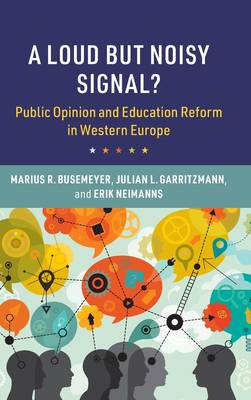
- Afhalen na 1 uur in een winkel met voorraad
- Gratis thuislevering in België vanaf € 30
- Ruim aanbod met 7 miljoen producten
- Afhalen na 1 uur in een winkel met voorraad
- Gratis thuislevering in België vanaf € 30
- Ruim aanbod met 7 miljoen producten
Zoeken
A Loud But Noisy Signal?
Public Opinion and Education Reform in Western Europe
Marius R Busemeyer, Julian L Garritzmann, Erik Neimanns
€ 191,95
+ 383 punten
Omschrijving
This path-breaking addition to the Comparative Politics of Education series studies the influence of public opinion on the contemporary politics of education reform in Western Europe. The authors analyze new data from a survey of public opinion on education policy across eight countries, and they also provide detailed case studies of reform processes based on interviews with policy-makers and stakeholders. The book's core finding is that public opinion has the greatest influence in a world of 'loud' politics, when salience is high and attitudes are coherent. In contrast, when issues are salient but attitudes are conflicting, the signal of public opinion turns 'loud, but noisy' and party politics have a stronger influence on policy-making. In the case of 'quiet' politics, when issue salience is low, interest groups are dominant. This book is required reading for anyone seeking to make sense of policy-makers' selective responsiveness to public demands and concerns.
Specificaties
Betrokkenen
- Auteur(s):
- Uitgeverij:
Inhoud
- Aantal bladzijden:
- 378
- Taal:
- Engels
- Reeks:
Eigenschappen
- Productcode (EAN):
- 9781108478496
- Verschijningsdatum:
- 3/09/2020
- Uitvoering:
- Hardcover
- Formaat:
- Genaaid
- Afmetingen:
- 193 mm x 231 mm
- Gewicht:
- 635 g

Alleen bij Standaard Boekhandel
+ 383 punten op je klantenkaart van Standaard Boekhandel
Beoordelingen
We publiceren alleen reviews die voldoen aan de voorwaarden voor reviews. Bekijk onze voorwaarden voor reviews.











